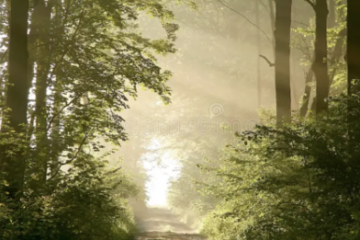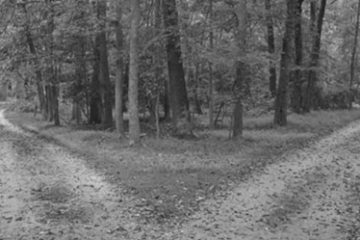Head Over Heels
A sermon by Trevor Bechtel
For Shalom Community Church June 7, 2020
As many of you know our niece Evelyn has come to live with Susan and I in these days when the pandemic has left her without a plan about which house she wants to live in. It’s transformed the last few weeks into time that all three of us will cherish rather than time we are just trying to get through. One advantage of living with Evelyn has been her Spotify Subscription and a different musical taste that we are used to. She also has never heard of a number of great bands from the 80’s that I happen to know quite well, and is a willing audience for a set of stories and songs I get to share again.
Anyways one night after listening to an excellent album by Julien Baker, Spotify choose to a play a band none of us had heard before called Japanese Breakfast covering The Cranberries’ “Dreams”. This piqued our interest and so we looked Japanese Breakfast up and found they–turns out they are one person, Michelle Zauner–had also covered Tears for Fears hit song “Head Over Heels”. Tears for Fears was one of the 80’s bands I had introduced Evelyn to earlier in the week so we played it.
It’s a haunting rendition of the very poppy original, and in some way more true to the rest of Tears for Fears material from their first two albums. Their first album, The Hurting, was deeply influenced by the work of Arthur Janov who developed primal therapy, a treatment for mental illness that involves repeatedly descending into, feeling, and experiencing long-repressed childhood pain.
As I listened to “Head over Heels” again reinterpreted through Michelle Zauner’s sparse keyboards and voice the lyrics, written 25 years ago, hit me very differently than they ever had before. “Head over Heels” is a simple love song, a departure for Tears for Fears, and their first international hit. But in these days with a international protest movement against police violence and the devaluing of black lives overlaid onto a pandemic so that the lives of just about everyone are changed, and the hearts of many people are also being transformed; the music resonated differently.
Preaching in these days might be a bit of a lost cause. Nothing I can say will match the moment. Our hearts and faith and bodies are pulled in so many directions. There is some wisdom here in the practice, more common in Black worship, of singing the words we hope for, even when our situation is different. We practiced that with Peace like a River this morning. On the other hand, when the stunned circle that we already find ourselves gathered into doubles in atonishment, it might be the case that any way in is worth trying. So I’m going to spend the next part of this sermon exegeting this song from one of my favorite bands. We begin:
I wanted to be with you alone
And talk about the weather
We all have renewed experiences with being alone in this time, either alone by ourselves, or alone with the few other people and animals we are staying at home with. It was an emotionally tricky time before George Floyd was murdered. I know that I’ve found that I’ve basically ceded my emotional state to the weather. On a sunny day, I’m doing alright.
You keep your distance with a system of touch
And gentle persuasion
This lyric was the point at which I sat up relistening to the song this week. In the pandemic, our systems of touch have altered, and the gentle persuasion of masks, staying at home, hand washing, and distance, have shifted the social fabric.
I’m lost in admiration, could I need you this much?
Oh, you’re wasting my time
And we realize how much we need each other and also how much our sense of time has shifted. What is time well spent? What is time wasted?
In the second verse we encountered the 2nd dynamic of our presently stunned circle.
I made a fire and watching it burn
Thought of your future
This lyric shifts my attention the fires, literal and metaphorical, burning across our country right now. I believe that there are times when in order for something to change–for the future to become what we need it to be–that the change needs to be abrupt; the kind of change that happens through fire. Fire is always complex and tricky. It can be the smoldering pain of living in a world where police will shoot at you because of the color of your skin. It can be the white hot rage of a system built to protect some people and hinder others. It can be a love of violence and destruction. It can be the liberating, cleansing, flames that clear away dead brush and open seeds to offer new life. We don’t always know what’s going to happen when we start a fire, or fan its flames. But even when it makes us uncomfortable we can recognize that sometimes fire is our only option.
My mother and my brothers used to breathe in clean air
And dreaming I’m a doctor
The very different opportunities and dangers that are available to us, based on the color of our skin, and gender, and sexual orientation, and social status; but decisively in this moment, to those who have black skin; should give us all pause. We’ve seen throughout the pandemic that African American communities have much higher incidence of infection and disease. We know that African Americans have much higher rates of incarceration and are more likely to live in areas of environmental degradation. We know that economic opportunity increases when you live in a White community and deep disadvantage persists when you live in a Black community. The very shape of ambition changes depending on the color of your skin.
It’s hard to be a man when there’s a gun in your hand
Oh, I feel so
This line has always stuck out to me. I was a pacifist when I first heard this song in high school and I’m still a pacifist now. But in high school I did not have a highly developed notion of either white supremacy or white fragility. I did not have a highly developed sense, even, of what racism is. That has changed pretty decisively for me in just the last five years. I’m not sure what tripped up inside of me to convince me that our country is a specter of white control built on stolen land and stolen labour. But I’ve come to see a connection between white control and white violence and most of the institutions in our society. That the police at the state capitol in Lansing allowed armed white protestors to invade the legislature without repercussion is an extreme expression of what is wrong with our political system, but more and more I recognize that the system is built for that kind of cowardice and that it is not an aberration. This is relatively new thinking for me and I still wear it somewhat uneasily, like the second phrase of this couplet, “oh, I feel so”
And that brings me to the chorus.
Attraction, and repulsion for that matter, aren’t emotions inside our control. Something happens and we are head over heels. We never find out, till we’re head over heels.
But we are seeing in our country right now the transformation of many people’s hearts towards greater justice and a conviction that black lives matter. We see this in marches, in protests, in personal testimony and in government response.
One of my favorite examples of this have been the decision by the Mayor of Washington to rename the street leading up to the white house Black Lives Matter Plaza, and to paint it in bold traffic yellow extending over two blocks. I wonder how long it will stay there, how often it will be repainted, how long this testament to George Floyd, Armaud Arbery and Breonna Taylor and the many other martyrs to the cause of justice will remain.
Because wherever we start from, be it an Aretha Franklin hymn, a Bach Cantata, a Bessie Smith standard, or Tears for Fears, what matters more than where we are now is where we are going. Where we are a year from is more important to justice than where we are now. And we will be sustained in this work when we see it as the work of love. Passages like the one read in 1 Corinthians can be interpreted as reinforcing the status quo; patient and kind, being slow to anger, and keeping no record of wrongs. But love is patient and kind only when it does not dishonor others, and seeks the other rather than ourselves. Love is built on Justice.
One of the ways that I’m head over heels this week is in terms of how I am thinking about our criminal justice system. I have long been committed to restorative justice. Our church has been one of the founding congregations of the Friends of Restorative Justice of Washtenaw County and I’ve enjoyed attending the meetings of FORJ over the last couple of years. But over the last week I’ve become more and more of an abolitionist someone who is interested in closing down the jails. I’ve been encouraged by the movement to defund the police. At the very least I know I’m committed to significant reform like that advocated by Samuel Singyanwe. These are new ideas but this week I’ve been head over heels with them.
My friend Jennifer Harvey, an expert on whiteness and religion, suggests three things that we can do to become allies of the change we want to see. We can educate ourselves: reading black authors, listening to black voices, remembering black lives. We can donate: using our economic power to support black business, black communities, and movement that work for racial justice. And we can protest: showing up for change. Tomorrow we can do that by stopping where ever we are for 8 minutes and 46 seconds at 5 o’clock to remember the live of George Floyd, joining thousands of others across the country brought together by the poor peoples campaign. I’ll send out an email with more details after the service.
Here’s my cover of Head over Heels.
Amen.


0 Comments